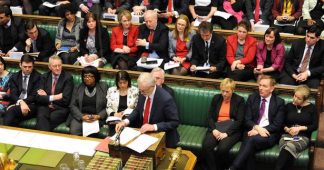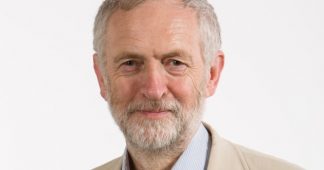By W. Hall Aegina, Greece
Jeremy Corbyn’s victory has unleashed a new dynamic in Britain’s Labour Party but, as pointed out in Defend Democracy Press’s lead article of 24th September, “the idea that the right wing are going to roll over and accept this leftward shift is fantasy.”
The split is not just one between “right” and “left”. It is a split between the Labour Party in parliament and the Labour Party outside parliament. Will Jeremy Corbyn and his supporters be capable of reframing the conflict as one not of ideology but of institutions. Will there be a focus on the question of whether members of the House of Commons really are representatives of the common people?
As for Britain’s other parliamentary chamber, the House of Lords, what is Labour’s relevant record? The Labour government of Harold Wilson tried (but failed) to introduce a system under which hereditary peers would be allowed to remain in the House of Lords and take part in debate, but not vote. Michael Foot as Labour leader favoured abolition of the House of Lords, only to have this policy overturned by his successor Neil Kinnock. The Labour Government of Tony Blair introduced legislation to expel all hereditary peers from the Upper House as a first step in Lords reform. Blair was forced to compromise and finally agreed to permit 92 hereditary peers to remain until the reforms were complete. So all but 92 hereditary peers were expelled under the House of Lords Act of 1999. This made the House of Lords predominantly an appointed house. Since 1999 no further reform has taken place.
What could be a possible next step for Labour? Why not reintroduce Michael Foot’s policy of abolishing the House of Lords, but with a variation. Let the House of Commons, whose Labour parliamentarians have now shown their true face, be renamed the House of Lords. The parliamentarians could stay in their existing House of Commons accommodation. The previous House of Lords could become a Citizens’ Assembly, competing for a mandate with the new House of Lords (former House of Commons) in a five yearly referendum, which would decide which of the two chambers would have legislative powers (for five years) and which of the two would be a house of review, a consultative assembly.
The Citizens’ Assembly would be comprised of active citizens and voted for by active citizens. Universal suffrage elections would apply only for the House of Lords, not for the Citizens’ Assembly. The Citizens’ Assembly would also be separated from all influence of the mass media. Its representatives would be obliged to communicate through the social media, using their own resources, not the media used by politicians addressing a universal suffrage audience through the medium of journalists. A court would have to be established to decide which politically engaged individuals can quality for, and retain, the status of “active citizen” rather than party politician. Any politician against whom a complaint is lodged that he or she is not complying with the requirement of avoiding party-political behaviour could be obliged by the court to stand for election as a universal-suffrage party politician if he or she wished to remain in politics.
At the five yearly referendum, whichever side won the mandate (House of Lords or Citizens’ Assembly) would acquire the right to have its representatives awarded the mandate at all lower levels (regional and local). This could however be overturned by a local or regional referendum (prior to a given deadline) if a significant number of voters within the given region or locality so demanded.
This is just a very general sketch of a type of constitutional reform that could be attempted by a Labour Party really intent on winning, and staying the winner. Can it be a starting point for debate?
parliament and the Labour Party outside parliament. Will Jeremy Corbyn and his supporters be capable of reframing the conflict as one not of ideology but of institutions. Will there be a focus on the question of whether members of the House of Commons really are representatives of the common people?
As for Britain’s other parliamentary chamber, the House of Lords, what is Labour’s relevant record? The Labour government of Harold Wilson tried (but failed) to introduce a system under which hereditary peers would be allowed to remain in the House of Lords and take part in debate, but not vote. Michael Foot as Labour leader favoured abolition of the House of Lords, only to have this policy overturned by his successor Neil Kinnock. The Labour Government of Tony Blair introduced legislation to expel all hereditary peers from the Upper House as a first step in Lords reform. Blair was forced to compromise and finally agreed to permit 92 hereditary peers to remain until the reforms were complete. So all but 92 hereditary peers were expelled under the House of Lords Act of 1999. This made the House of Lords predominantly an appointed house. Since 1999 no further reform has taken place.
What could be a possible next step for Labour? Why not reintroduce Michael Foot’s policy of abolishing the House of Lords, but with a variation. Let the House of Commons, whose Labour parliamentarians have now shown their true face, be renamed the House of Lords. The parliamentarians could stay in their existing House of Commons accommodation. The previous House of Lords could become a Citizens’ Assembly, competing for a mandate with the new House of Lords (former House of Commons) in a five yearly referendum, which would decide which of the two chambers would have legislative powers (for five years) and which of the two would be a house of review, a consultative assembly.
The Citizens’ Assembly would be comprised of active citizens and voted for by active citizens. Universal suffrage elections would apply only for the House of Lords, not for the Citizens’ Assembly. The Citizens’ Assembly would also be separated from all influence of the mass media. Its representatives would be obliged to communicate through the social media, using their own resources, not the media used by politicians addressing a universal suffrage audience through the medium of journalists. A court would have to be established to decide which politically engaged individuals can quality for, and retain, the status of “active citizen” rather than party politician. Any politician against whom a complaint is lodged that he or she is not complying with the requirement of avoiding party-political behaviour could be obliged by the court to stand for election as a universal-suffrage party politician if he or she wished to remain in politics.
At the five yearly referendum, whichever side won the mandate (House of Lords or Citizens’ Assembly) would acquire the right to have its representatives awarded the mandate at all lower levels (regional and local). This could however be overturned by a local or regional referendum (prior to a given deadline) if a significant number of voters within the given region or locality so demanded.
This is just a very general sketch of a type of constitutional reform that could be attempted by a Labour Party really intent on winning, and staying the winner. Can it be a starting point for debate?











